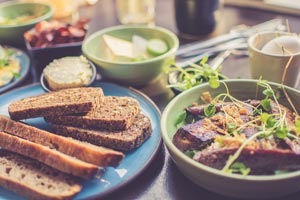
Eating and cancer: answers to frequently asked questions
Given the importance of a healthy eating habit for cancer management, Dr. Francesco Anichini, dietitian at the Medical Oncology and Immunotherapy Unit of the University Hospital of Siena, identified some of patients’ most frequently asked questions and provided clear, exhaustive answers to clarify many of the doubts currently circulating on such a widely debated topic.
- Is it true that healthy eating can prevent the development of cancer?
-
I heard that some foods should be completely excluded from our diet because they “feed cancer cells”: is this true?

It should be noted that there are no “taboo foods” that must be completely excluded from the diet. I would say that if we pay more attention to the quality, frequency and quantity of our food, we are unlikely to have “food intoxication”.
In the more developed countries, however, the eating style has progressively changed – especially during the past two centuries – as compared to the traditional diet followed by our ancestors for thousands of years.
First of all, we have less physical activity, and secondly, as a result of industrial manufacturing processes and modern stock raising and preservation techniques, we have considerably increased our consumption of food of animal origin (meat and dairy products), which in the past were eaten quite occasionally.
We also consume foods that were previously unknown, including those obtained using modern technologies such as white sugar and refined flours, products that are chemically extracted from oilseeds or oil fruits (refined oils), and even foods that were not naturally occurring in the past (hydrogenated fats and margarines commonly found in many packaged long-shelf products, especially baked products).
This eating style increasingly rich in processed and packaged products has gradually resulted in nutrient deficiencies, including vitamins, fibers, micronutrients and antioxidants, with major effects on the defenses of our immune system and the associated development of the most common diseases of our times.
-
I heard that I should not eat meat because it is carcinogenic: how much is this true?

The term “meat” is very broad, and there are a few things that should be clarified. It is also essential to take into consideration many factors (type of breeding, origin, preservation of the meat) that influence a product’s quality.
Humans have been eating meat for thousands of years, yet the meat dilemma has been raised only recently with the large availability of this product, often characterized by poor quality and preservation methods (smoking, curing, maturation and addition of chemical preservatives) that can damage the walls of our stomach and gut. Moreover, due to the high meat demand, large breeders have replaced extensive stock breeding with intensive breeding, where animal feedstuffs may contain traces of prohibited substances such as antibiotics (to prevent animal diseases) and hormones (to stimulate growth) that are harmful for our health.
Based on data from studies conducted on the association between meat and tumor development, the International Association for Research on Cancer (IARC) has included processed meat (canned meat, sausages and cured meat, frankfurters) in the list of known carcinogens (alongside with asbestos, ethyl alcohol and tobacco smoking, UV radiation and human Papillomavirus).
The reason for this lies in the products commonly used for meat preservation, a mixture of nitrites, nitrates and salt, which are believed to promote the development of nitrosamines, defined by the US Food and Drug Administration (FDA) as “one of the most potent group of carcinogenic substances ever discovered”. An analysis of epidemiological studies has shown that the consumption of 50 g of processed meat every day increases the risk of developing colorectal cancer. However, an association has been also found with the risk of pancreatic, stomach and prostate cancers.
Red meat (beef, pork, veal, venison) has been included in the list of probable human carcinogens; the risk increases in those who follow a diet with a reduced intake of vegetable fibers from grains, fruits and vegetables. The World Cancer Research Fund (WCRF) has recommended to eat no more than 500 g of red meat weekly; for cancer patients, the recommended weekly consumption is no more than 300 g.
These data should be interpreted with caution, because they do not always take into account the quality and breeding technique of the meat, as well as the cooking method and dressing, which may significantly affect the results. Conversely, the consumption of poultry and fish has not been associated with an increased risk of cancer – certain studies have even shown that they have a protective effect.
Therefore, alarmism over meat consumption should be avoided, although it is important to take appropriate precautions to avoid indiscriminate consumption of these products. First of all, it is essential to consume high quality meat, which should be appropriately certified (and preferably organic).
Poultry (chicken, turkey, rabbit) should be eaten about 2 times a week, while red meat must be eaten less frequently and without exceeding 200-300 g weekly.
While processed meat should be generally avoided, it may be consumed only occasionally, preferably choosing good-quality freshly-sliced (not prepackaged) cured ham or cured beef and not exceeding 50 g.
Finally, when consuming meat, it is recommended to also include fruits and vegetables to keep the walls of our digestive system clean, and to use simple cooking methods (roasting, steaming, baking, etc.) while avoiding grilling or prolonged cooking, which may produce substances such as polycyclic aromatic hydrocarbons and heterocyclic amines – potential carcinogenic agents.
-
I heard that sugar is thought to feed cancer cells: does this mean that sugar should be excluded from the diet?
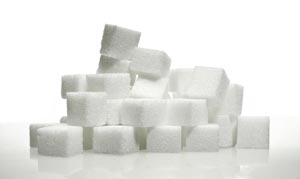
Glucose, the primary molecule generated from the breaking down of sugars, is the main fuel for cells (including cancer cells). Glucose intake rapidly increases the levels of insulin in the blood, and the release of large quantities of insulin is associated with the production of cell growth factor IGF-1, and in women, with the production of testosterone, an important risk factor especially for breast cancer.
An excessive consumption of sugars is also associated with increased body weight (the excess sugars are broken down by the liver and transformed into fat as energy reserve) and with an increased predisposition to obesity, which is known to be one of the main risk factors for the development of several types of cancer.
However, not all sugars are the same: what makes the difference is the glycemic load of foods, which takes into account both the absorption rate and the amount of the sugar consumed.
Therefore, it is recommended to limit the consumption of fast absorption sugars that cause larger glucose fluctuations (added sugars, white or cane sugar, breakfast cereals, glucose syrup, sugary drinks, cakes, pastries, biscuits, confectionery products, candies, spreads, etc.).
Fruits are rich in a simple sugar (fructose), but they also contain fibers, vitamins and mineral salts that decrease the absorption rate of the sugar; therefore, appropriate amounts of fruits (2 servings daily) can be safely consumed.
Other sources of sugars such as grains and their derivatives (pasta, bread, rice, spelt, kamut, etc.) and pulses are complex sugars that need a longer digestion to be absorbed and have a lower impact on blood glucose levels, especially when eaten in the whole grain form and in combination with fibers (vegetables), proteins (lean meat, fish, eggs, etc.) or fats (olive oil, nuts, etc.).
-
Is it true that milk is bad for our health?
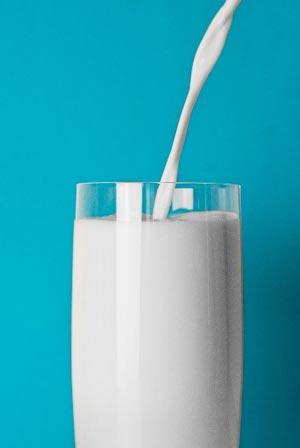
The role of milk and dairy products in human health is a highly debated topic in both the scientific and lay communities; however, it is important to avoid proclamations such as “milk causes cancer”, because they are not supported by any strong scientific evidence. On the other hand, the wisest approach is to consume milk, as well as many other foods, moderately and not too often (2-3 times weekly) to avoid overload and intoxication.
From a nutritional point of view, milk is a complete food that ensures a rapid growth of infants since their first months of life. However, after 2 years of age, lactase – an enzyme that is responsible for breaking down lactose – progressively reduces its activity. This causes difficulties in digesting milk and the onset of abdominal disorders (bloating, diarrhea).
If you are receiving anti-cancer therapies, you should limit the consumption of milk and dairy products as much as possible, because your body’s ability to digest lactose would be further reduced and you would be more at risk of developing bowel inflammation (colitis) and diarrhea.
-
What foods should be particularly limited for the prevention or management of cancer?

Based on the systematic review of scientific publications, the most important international health organizations have issued recommendations to reduce the risk of developing cancer.
Consumption of the following foods should be limited: high-calorie foods (rich in sugar and fats), red meats, dairy products, salt (do not exceed 5-6 g daily) and especially foods that contain higher amounts of salt (canned food, packaged products, cheese, sausages, broth cubes, sauce, baked products, salt-preserved foods).
Foods that should be particularly avoided include sugary drinks and preserved meats. Foods that have a higher impact on the development of obesity and that should be limited, especially in children, include: fried potatoes, confectionery (especially when packaged), biscuits, pastries, fast food (hamburgers, sausages, hot dogs), sugary soft drinks, artificial sweeteners, sugar- or chocolate-coated cereals, excessive amounts of milk and high-fat cheese, ice creams, sweetened yogurts, spreads and toppings, margarine, pre-cooked food, pizza.
Another recommendation for cancer prevention is to avoid alcoholic drinks.
The primary molecule contained in these drinks is ethanol, a substance whose degradation product is acetaldehyde, which is associated with severe toxicity, especially in the liver. Studies have shown that the individuals who consume more than the recommended amounts for prolonged periods of time are more likely to develop tumors of the mouth, pharynx, larynx, esophagus, colon, liver, pancreas and breast. With the exception of special contraindications, it is recommended to limit the consumption of alcoholic drinks to a maximum of one glass of red wine (120 ml) for women and two glasses for men, only during the meals.
Finally, it is important to avoid mold-contaminated foods, which may be carcinogenic (especially grains, pulses and nuts) due to the formation of compounds called aflatoxins that damage the liver. Therefore, it is important to verify that these foods have been properly preserved and do not store them in hot, humid places.
These recommendations for the nutritional prevention of cancer also apply to people who already have cancer, although the available data from relapse prevention studies are still limited.
-
Is the purchase of organic food a good strategy for our health or is it simply a choice driven by fashion and marketing?
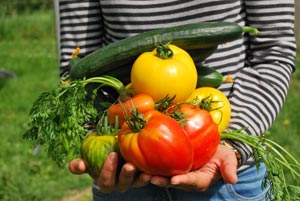
While products from organic agriculture and animal husbandry were exclusively available at specialized stores until a few years ago, they are now commonly found in any supermarket. Those who do not support the organic choice are mainly concerned by the higher costs of these product and the fact that organic certifications are not always granted in compliance with the established standards at all steps of the production chain.
An interesting epidemiological study recently published in JAMA Internal Medicine evaluated the association between frequency of organic food consumption and risk of cancer.
The investigators observed that those who consumed organic food had a 25% lower risk of developing cancer. In particular, they had a 73% lower risk of developing non-Hodgkin lymphoma and a 21% lower risk of post-menopausal breast cancer. The study concluded that “if these results are confirmed, promoting the consumption of organic food in the general population may become a promising prevention strategy against cancer”.
Therefore, I think that, as organic products are anyway safer than conventional products, they should be preferred whenever available.
When organic products cannot be purchased, it is important to check the nutrition information of all other products, verify the ingredients and pay special attention to the additives, preservatives, sweeteners and added sugars reported in the label, and always prefer local and good-quality products.
-
I’ve been suggested to use supplements: can I take them?
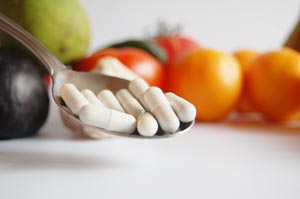
Let us not fool ourselves: we cannot prevent or treat cancer using products for which there is no scientific evidence in terms of safety and beneficial effects.
All cancer prevention studies on supplements have been a failure.
It is impossible to combine in one pill the thousands of protective substances that are found in a lot of foods, and in the amounts naturally available in them. If we ingest a poison, the higher the dose the greater its toxic effect; unfortunately, the same does not happen with beneficial molecules such as those commonly found in fruits and vegetables. In fact, just because a substance is good for the health does not mean that a higher intake is associated with more benefits. On the contrary, higher doses (for examples, smoothies containing a lot of different fruits or a mix of pills) could affect homeostasis and our biological balance.
The use of supplements should be considered only in case of mineral or vitamin deficiencies as documented by appropriate blood tests, or in the presence of malnutrition, diarrhea, gastro-resection, anemia, very restrictive or vegan diets, or problems such as dysphagia, difficulty chewing, anorexia and cancer cachexia, intestinal malabsorption, which make it really impossible for the subject to reach an appropriate calorie intake.
Therefore, it is recommended to ensure that the body receives the appropriate amount of essential nutrients with food, and eat a varied diet by choosing as many different types of food as possible.
-
I’ve often heard of fasting, ketogenic diet or alkaline diet. What is your opinion about them?

The first thing to say is that a one-fits-all healthy diet doesn’t actually exist, as each nutritional program should be customized according to individual needs and therapeutic setting, and taking into account a subject’s physical, psychological and environmental conditions.
Fasting is often mentioned as a way to give a rest to the various organs of the digestive system, and (in a more spiritual perspective) to “cleanse our body” from the accumulated toxins ingested with food.
There are no conclusive data to support this, but it would be a good practice to reduce calorie intake in the evening meal before the day of anti-cancer treatment (semi-fasting), which means consuming most of the food in the first part of the day and having a very light meal the evening before therapy.
The alkaline diet is based on the assumption that cancer cells tend to proliferate in an acid pH environment, and has been made popular by the mainstream media that promote foods, waters and supplements that increase blood pH alkalinity.
This approach has been obviously contested by the scientific community, which claims that our body tends to find and maintain a certain physiological homeostasis, and that there is no evidence demonstrating that the consumption of alkaline foods increases blood pH.
Finally, the ketogenic diet is based on a very marked reduction of both simple and complex sugars, which involves a low-calorie diet mainly consisting of fats and proteins.
The evidence from the literature shows that this diet can help losing body weight very quickly before bariatric surgery (or obesity surgery) and in case of epilepsy. Even in such circumstances, however, the ketogenic diet should be followed for a limited period of time only and under qualified medical supervision.
It should be noted that following a low-calorie diet for prolonged periods of time may cause wasting (loss of muscle mass and strength) and depression, and is likely to create a bad relationship with food, sometimes resulting in an eating disorder, which should be avoided especially in cancer patients.
-
What do you think of vegetarian and vegan diets?
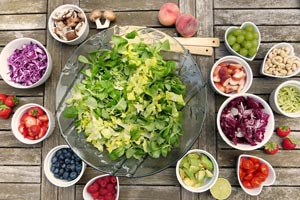
I have great respect for individual choices, especially when they are driven by moral or cultural principles.
From a nutritional point of view, the vegetarian choice – when just limited to the exclusion of meat from the diet – does not show any major contraindications. It is possible not to consume meat in the adult age, on condition that it is appropriately replaced with, for example, a main course that includes grains and pulses (pasta with chickpeas, pasta with beans, rice with lentils, etc.).
As regards the vegan diet, that is based on the exclusion of any form of animal protein, there are strong concerns because there is no evidence in the literature that supports this food model, and it involves the risk of causing significant nutrient deficiencies (especially Vitamin B12).
Moreover, the exclusion of fish from the diet may turn out to be a bad choice, as fish is a good source of omega-3 fatty acids, which are essential to reduce inflammation and fat levels in the blood.
-
What are the recommended foods and the best food model?

The Mediterranean diet model is supported by the largest amount of favorable clinical data.
A systematic review of scientific literature has shown an inverse association between adherence to the Mediterranean diet and cancer-related overall mortality, with a lower risk of developing several types of cancer, including cancers of the breast, colon/rectum, stomach, prostate, liver, head and neck, pancreas and lung. Moreover, the review showed a reduced incidence and mortality rate for cardiovascular diseases, Parkinson’s and Alzheimer’s disease.
The Mediterranean diet is not only based on the consumption of certain foods, but also on regular physical activity, adequate duration of sleep and the sociable nature of eating. Other important aspects include biodiversity and seasonality of food, respect for local traditions and environmental sustainability.
As regards the foods included in the Mediterranean diet, it should be noted that this diet is mainly based on vegetable foods and on the authenticity of products (“poor” diet).
Recommended foods include:
- grains and derivatives (pasta, bread, rice, etc.): every day, using different qualities and preferably choosing ancient grains (that contain less gluten), with a preference for whole grains
- pulses (chickpeas, beans, lentils, peas, lupines): more than 2 servings weekly
- fresh seasonal vegetables: 2 servings daily, either cooked or raw, trying to mix vegetables of different colors and using, whenever possible, asparagus, red cabbage, white and Savoy cabbage, broccoli, Brussel’s sprouts, lettuce, red leafed chicory (Radicchio Rosso), Jerusalem artichokes, red beet, artichokes
- fresh seasonal fruits: 1-2 servings daily, with a preference for pomegranate, red oranges, khaki, cherries, strawberries, black plums, black grapes, pineapple, wild berries (blackcurrants, raspberries, cranberries), peaches, nectarines, apples, pears
- nuts (walnuts, almonds, hazelnuts, unsalted pistachios) and seeds (sesame, linseed, pumpkin, sunflower, chia): one serving daily
- extra virgin olive oil, preferably used in raw form for dressings, drizzles and dips
- herbs and flavors (basil, oregano, parsley, sage, mint, garlic, onion)
- spices (turmeric, pepper, ginger, curry, cinnamon, etc.)
- whitefish (cod or hake, sole, dogfish, plaice, grouper, etc.) or bluefish (sardines, anchovies, mackerel, salmon), preferably small-sized, 2-3 servings weekly; consumption of large fish such as tuna and swordfish should be limited, as they tend to accumulate the highest levels of heavy metals from the sea
- good-quality poultry (chicken, turkey, rabbit): 2 servings weekly
- organic or free-range eggs: 2 servings weekly
- dairy products: prefer parmesan cheese (parmigiano reggiano or grana) 30 months aged, free of lactose and preservatives that may damage the gut, as well as white yogurt and kefir (fermented products that contain beneficial bacterial strains)
- other foods that have demonstrated to be beneficial for the health include green tea and dark chocolate with >70% cocoa content
- use simple and quick cooking methods, such as boiling, steaming, en papillote, or microwaving, using nonstick pans (without scraping the surface) and pressure cooker. Avoid sautéing and deep-frying, and do not cook oil for too long and at high temperatures. Limit grill cooking and prolonged cooking, and remember that the food should not be in direct contact with the heating source.
Contact

Via G.B. Giorgini 16 - 20151 Milano
Tel. 02.3343281 - Fax 02.33496370
email: effetti@effetti.it
web: www.effetti.it - www.makevent.it
Forgotten password
Please enter your email address to receive a message with instructions to recover your login credentials.



